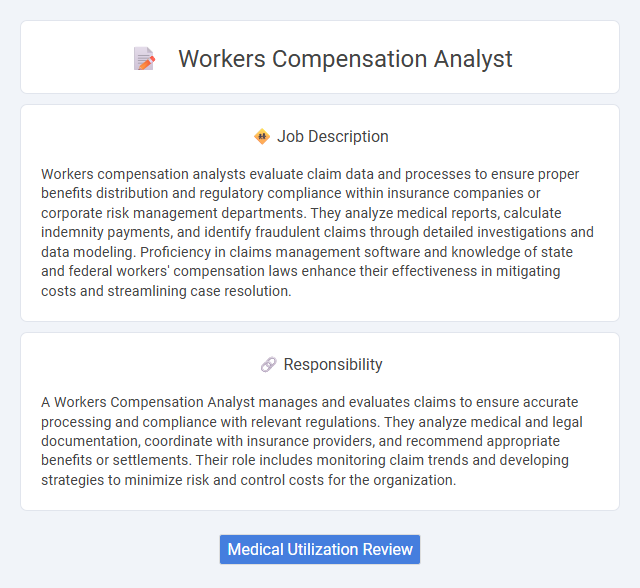
Workers compensation analysts evaluate claim data and processes to ensure proper benefits distribution and regulatory compliance within insurance companies or corporate risk management departments. They analyze medical reports, calculate indemnity payments, and identify fraudulent claims through detailed investigations and data modeling. Proficiency in claims management software and knowledge of state and federal workers' compensation laws enhance their effectiveness in mitigating costs and streamlining case resolution.
Individuals with strong analytical skills and attention to detail are likely suitable for a Workers Compensation Analyst role, as the job involves evaluating claims and ensuring compliance with regulations. People who tolerate repetitive tasks and can navigate complex data may find this career fitting. Those struggling with high-pressure environments or accuracy demands might face challenges in this position.
Qualification
A Workers Compensation Analyst typically requires a bachelor's degree in business, risk management, or a related field, alongside strong knowledge of workers' compensation laws and claims processing. Proficiency in data analysis, attention to detail, and experience with claims management software are critical for accurate evaluation and reporting of injury cases. Certification such as the Associate in Claims (AIC) or Certified Workers' Compensation Professional (CWCP) enhances expertise and career advancement opportunities in this field.
Responsibility
A Workers Compensation Analyst manages and evaluates claims to ensure accurate processing and compliance with relevant regulations. They analyze medical and legal documentation, coordinate with insurance providers, and recommend appropriate benefits or settlements. Their role includes monitoring claim trends and developing strategies to minimize risk and control costs for the organization.
Benefit
A Workers Compensation Analyst likely focuses on assessing and managing employee injury claims to ensure accurate and timely benefits distribution. Their role probably involves analyzing data to optimize benefit delivery and reduce costs for both employees and employers. Efficient management by these analysts may result in improved claim processing and enhanced financial protections for injured workers.
Challenge
Workers compensation analyst roles likely involve complex data analysis and thorough review of injury claims, which can present significant challenges in maintaining accuracy under tight deadlines. The necessity to interpret intricate legal and medical information may require strong analytical skills and attention to detail. Managing fluctuating case volumes could also lead to unpredictable workloads, testing an analyst's adaptability and problem-solving abilities.
Career Advancement
A Workers Compensation Analyst evaluates claims to ensure accurate benefits and regulatory compliance, playing a crucial role in risk management within insurance and corporate sectors. Mastery in data analysis, legal knowledge, and effective communication enhances opportunities for advancement to roles such as Senior Analyst, Claims Manager, or Risk Management Director. Continuous professional development and certifications like Certified Workers' Compensation Professional (CWCP) significantly boost career growth and salary potential.
Key Terms
Medical Utilization Review
A Workers Compensation Analyst specializing in Medical Utilization Review evaluates medical treatments to ensure compliance with workers' compensation guidelines and cost-effectiveness. They analyze medical records, treatment plans, and provider claims to determine the necessity and appropriateness of care for injured workers. Expertise in regulatory standards, medical terminology, and insurance policies is essential for optimizing medical benefits and reducing unnecessary expenses.
 kuljobs.com
kuljobs.com